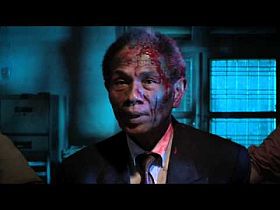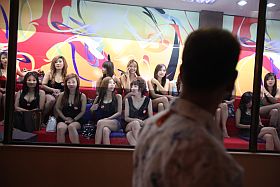


Jørgensen & Sønderby Jepsen: Blodets Bånd
Vi har set mange tv-programmer om børn, der er tvangsfjernede. Vi har set masser af programmer om børn, hvis opvækst blev mere eller mindre ødelagt af deres fars eller mors, eller begges alkoholisme. I de fleste tilfælde har det været programmer, hvor voksne ser tilbage på deres barndom. De fleste af os har haft alkoholikere i vor omgangskreds eller familie. Det har givet sår på sjælen.
I den forstand er ”Blodets Bånd” anderledes. Den foregår ikke i et tilbageblik, den foregår her og nu, hvor Svend Åge Hansens to døtre Christina og Michelle, og til dels sønnen Daniel, er i gang med at få et godt forhold til deres far, som de elsker på trods af en barndom i et voldeligt alkoholhelvede, hvor de blev tvangsfjernet fra faren og moren Gitte, som også spiller en væsentlig rolle i filmen. Det fjerde barn har Svend Åge og Gitte ikke kontakt med og resten af de 16 børn (!), som Svend Åge har, medvirker ikke og deres ansigter er sløret i filmens åbningssekvens, hvor en familietavle omkring Svend Åge er konstrueret.
Adskiller filmen sig så fra tv-programmerne? Egentlig ikke, for den holder ikke fortællemæssigt, hvad den lover og er i mange henseender mere et tv-program end en film. (Skuffende når man tænker på Sønderby Jepsens ”Testamentet”, der har et naturligt flow). Tidligt i filmen introduceres papkassen, sagsakterne, de mange sider, som der fra myndighedernes side er skrevet om Svend Åge og hans svigt af børnene. For hvert af børnene er der en sagsmappe, og vi ser hovedpersonen og hans døtre læse i papirerne. Det passer ikke, hvad der står, siger Svend Åge, der ikke kan
huske noget, ligesom moren til kameraet siger, at hun ikke kan huske, at han har banket hende. Papkassen og dens dokumenterende indhold introduceres altså, men den bliver ikke brugt til noget. På almindelig tv-vis bliver der gang på gang fokuseret på nogle sætninger i sagspapirerne, disse bliver læst op for vores skyld, til os seere, for de involverede bliver sætningerne aldrig læst op, vi får ikke deres kommentarer, blot konklusionerne, at børnene blev tvangsfjernet – og så ser vi plejeforældrene i et sløret billede. Jo, børnene siger, at det er ”systemets skyld” og Svend Åge mener at tvangsfjernelsen fastholdt ham i misbruget. Systemet introduceres – men der er på intet tidspunkt i filmen tale om at diskutere om der fra myndighedernes skyld er begået fejl.
Instruktørerne kæmper en kamp for at gøre Svend Åge til en sympatisk figur. De er til stede ved fødselsdage, hvor han erklærer sin kærlighed til sine børn og stiller sig op på stolen for at synge ”Kender I Svend Åge”, han er en karismatisk sjuft, men ”en flink fyr” som nogle uidentificerede stemmer på lydsiden i filmens start, Hadsund-boere er det vel, det er Svend Åge ikke, selvom han gør, hvad han kan for at give det indtryk. Scenerne med børnene har en ægthed over sig, hvorimod moren nærmest bliver skurken i fortællingen. Hun gjorde ikke noget for at standse volden, hun holdt op med at drikke, siger hun, kan intet huske, bliver nærmest ”dømt” af børnene. Og filmens instruktører giver hende heller ikke mange chancer ved demonstrativt at bringe en sekvens, hvor hun danser med en mand, der falder om på gulvet, skidefuld. Fik I den seere, hun fortsætter i samme skure!
Hun virker medicineret og omkring hendes figur, akkurat som omkring mange scener i filmen, rejser der sig et væld af etiske spørgsmål. Hvorfor lagde filmholdet ikke kameraet ned og hjalp til, da Svend Åge er ved at hamre hovedet i asfalten vaklende hjem fra værtshuset? Hvorfor skal vi se Daniel hulke hjerteskærende i scenen, hvor han ikke kan komme ind på diskoteket? Hvorfor følges der ikke op på scenen, hvor incest antydes? Hvad er meningen med den ultrakorte scene med Christina og en psykolog? Hvorfor panoreres der henover det totale rod i Christinas lejlighed, er det for at fortælle os at hun ikke har styr på sig selv og sin tilværelse?
Jeg synes, at filmen har ondt i etikken. Den går efter det sensationelle, også i sit presseoplæg, hvor filmen ”sælges” på at Svend Åge har 16 børn, hvilket i øvrigt overhovedet ikke er et tema i filmen. Tabloidpressen følger op, Ekstra Bladets forside fortæller, at Svend Åge drikker 40 øl om dagen og vær sikker på at samme type avis vil finde frem til Ivan, der ikke har kontakt med familien, eller til landbrugsministerens datter, som har et barn med ”sæddonor” Svend Åge. Eller, eller… Smæk for skillingen, godt stof. Svag film.
Danmark, 90 mins., 2013


